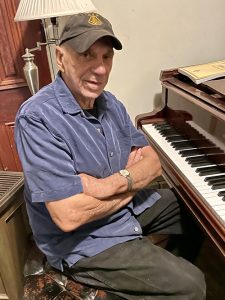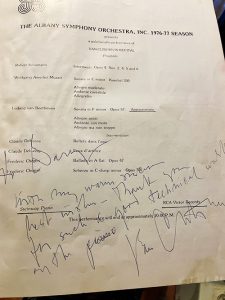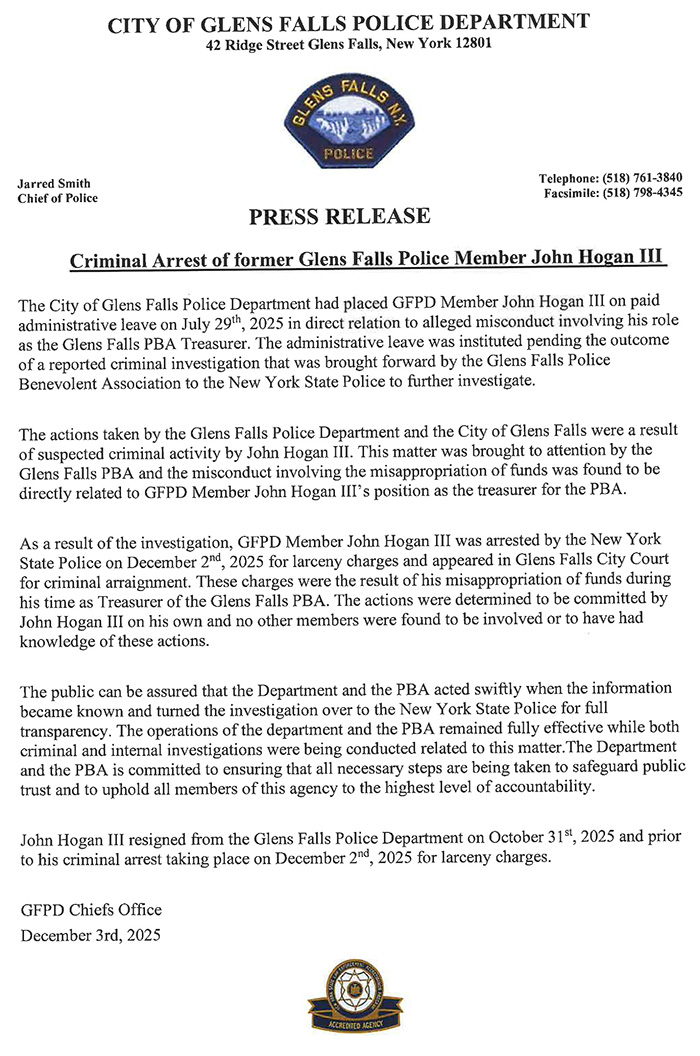By Cathy DeDe, Chronicle Managing Editor
Small framed, casual and a little quirky, in a baseball cap and muscled arms, speech measured but intent, Gary Gallucci isn’t the stereotypical 80-year-old (whatever that is).

His Gansevoort home is more a live-in workshop, with maybe a dozen or more grands, players, uprights and other pianos in ongoing states of repair; shelves of sheet music; walls of small storage boxes containing parts and tools.
Mr. Gallucci was born in 1944 in Albany.
“My family had nothing to do with music, really. I was just attracted to the piano. When I was 12, I started repairing my own old upright that my grandmother got for me, and I met the leading piano tuner in Albany who was looking for an apprentice. He was German, Alden Crounse.
“After he saw what I was doing with my old upright, he said, ‘You have talent in this field.’”
Young Gary wanted to be a pianist.
His mentor admonished, “You won’t make a living playing the piano, and you have ability in this field.
“Later as time went on, I just decided that he was right.”
He found work with the Steinway dealer Cluett & Sons in Albany, he recalls. The company, founded in 1851, predated Steinway by two years, Mr. Gallucci notes.

They’d send him to tune when they loaned the Steinways out for concerts, “so I got familiar with working with concert pianists.
“The first one I met was John Browning, who’s deceased now. Most of all the people I knew have all passed on.”
Following a string of Steinway dealers, Mr. Gallucci wound up working with Ned Spain at Braydon and Chapman Music Store in Glens Falls — all while also working closely with the people at Steinway, where he learned the technical side, repairing and tuning the pianos.
Braydon and Chapman sent him to the Saratoga Performing Arts Center, tuning pianos for the guest artists on their loaned Steinway, too.
The famous names fly quickly:
“The first time I met Van Cliburn was there,” he says, citing the storied American pianist, famed for retiring early from the public stage, and namesake of a prestigious piano competition
“Eugene Ormandy” — Hungarian-American conductor of the Philadelphia Orchestra — “I heard a lot of things about the conductor, how very difficult and fussy he could be. He even had an argument with Rachmaninoff at one time.
“So the first time I went there, I expected maybe there’d be some problems.”
This was in the 1960s, Mr. Gallucci recalls. “A representative of Steinway came with me to make sure everything went okay.
“We had sent our concert grand down, and there was always a note on the piano saying the Maestro wants A-442, which is a little bit higher.”
This has to do with the sound frequency or pitch, he explains.
“When I first met Ormandy, he said, ‘Oh, a piano tuner. You and I are natural enemies, like cats and birds.’”
He’d famously clashed with head Steinway tuner Franz Mohr, both forevermore “mortal enemies,” Mr. Gallucci recalls.
“Anyways, I estimated from the tuning fork that I had an A-442, and tuned it.
“Ormandy came over and hit an A chord, and he said, ‘Okay.’
“I said to myself, just like that, ‘Okay,’ after all the stories I heard?”
Ormandy asked, “What’s your name and where are you from?”
Glens Falls? “Ormandy said, ‘I used to go with a girl from Glens Falls.’ The Steinway guy with me laughed. He said, ‘You know, he’s just kidding.’
“From then on, we got along great.”
Van Cliburn, he says, “was very nice. I used to light his cigarettes,” for a last smoke before he got on stage. “Later he had to quit and he’d put a Lifesaver in his mouth.
“I spent a couple hours with his mother backstage. I mentioned that the leading critics in Albany and the pianists liked her son very much. Cliburn was always being criticized by the critics in New York.”
Mr. Gallucci has a note from Van Cliburn, signed on the program of a gala recital with the Albany Symphony in 1976: “To Gary, with many warm sincere best wishes. Thank you for such a good technical work on the piano.”
He’s got a scrapbook of signatures also, not all easily read but including Rudolf Serkin, Peter Nero (“thanks for the Grade A ‘A’), jazz great Bill Evans, Victor Borge.
“Very nice,” Mr. Gallucci says of Borge. “I worked for him when he was a young man, then I worked for him when he was an older man.”
John Denver? “Tremendous ego. He would look right through you.”
Chet Atkins, the guitar player? “Very nice guy. Also a band promoter.”
Robert Goulet? Jim Nabors? “Nice.”
Private piano owners: He had a Glens Falls client with a piano she didn’t realize was signed by American great William Kapell, who died young.
One young couple inherited a nothing-much upright, which turned out to have stacks of $100 bills hidden inside.
In the piano of a different client, Mr. Gallucci says he found stuffed in the leg a similar stash of cash he’d accidentally pulled out of its hiding place, only to have the owner beg, “Send me a bill; I can’t pay you now.”
“Steinway is still the best piano,” Mr. Gallucci says. “By the turn of the century, really 1890 even, they had them perfected. There was no reason to change it.”
He says he and Henry Steinway became good friends and that when Henry sold the company, it was from fear of competition. “He was worried. Yamaha had come a long way, he said,” Mr. Gallucci recalls.
“I should have told him then, they’ll never be Steinway.”
Mr. Gallucci remains busy, pianos in the shop, tunings across the state, into New Jersey and Vermont.
Besides the technical skills, “You have to have a good ear. Around anything loud, anything at all, I always made sure that I had ear plugs. They want to blame loss of hearing on old age, but my take is that it’s years of abuse. Fortunately, I preserved my hearing and anyways, that’s paid off considerably.
Copyright © 2024 Lone Oak Publishing Co., Inc. All Rights Reserved
 Glens Falls Chronicle Serving the Glens Falls/Lake George region; Warren, Washington and northern Saratoga counties since 1980
Glens Falls Chronicle Serving the Glens Falls/Lake George region; Warren, Washington and northern Saratoga counties since 1980


